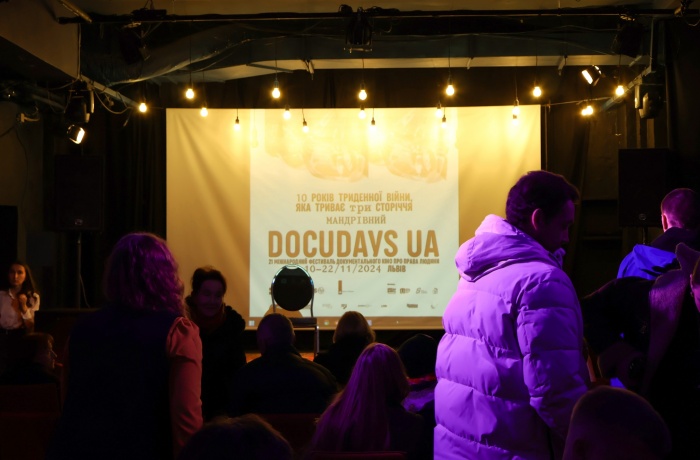
Despite all the challenges of the war, the Travelling International Human Rights Documentary Film Festival Docudays UA took place this year for the twenty-first time! The festival continues to unite Ukrainians around the values of freedom, equality and dignity and to create platforms for public dialogue.
In October and November, we travelled around the cities and villages of the country, gathered together again, watched talented films — often under fire in bomb shelters and without electricity with charging stations. After the screenings, we reflected on our experiences, discussed reality and pondered our own responsibility for the future.
Today, we will share our memories with you and summarise the incredible 21st Travelling Fest.
We are living in historic times when the words, decisions and actions of each and every one of us will determine what Ukraine and the whole world will be like tomorrow. However, in order to build the future with confidence, we must learn the lessons of the past: understand and rethink our identity, create historical memory, bring war criminals to justice, and most importantly, establish an effective security architecture for ourselves. So this time, we were reflecting on 10 years of a three-day war that has lasted for three centuries, the central theme of the 21st Docudays UA, which was defined by this phrase, full of light irony and contradictions, but in fact so true that it has already become part of the new Ukrainian folklore.
The Travelling Docudays UA opened symbolically on 8 October in Boryspil with the film about the declassified archives of the USSR KGB, The Kyiv Files, by the Dutch director Walter Stockman. The plot of the film consists of several stories: the dissident couple Lisovi, an amateur Dutch spy, and a French tourist of Ukrainian origin. By interweaving them, the director explores the scope and methods of the Soviet Unionʼs secret service and immerses us in the times when everyoneʼs personal life was pervaded by the paranoia of the totalitarian regime.
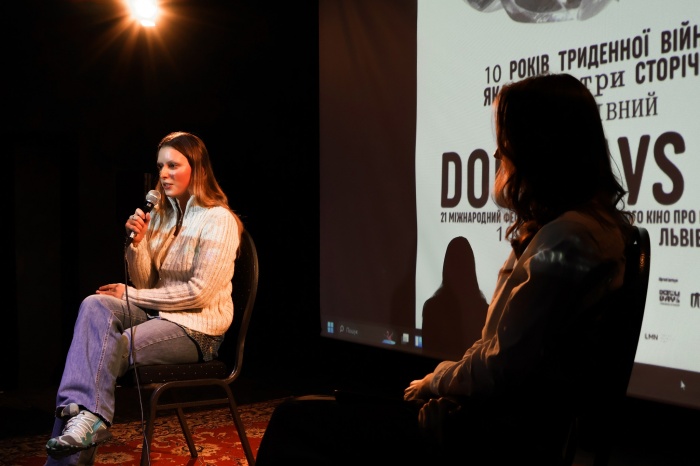
Screening of the film Boots on the Ground, Hands in the Soil in Lviv with the participation of the director Karolina Uskakovych.
Not only the films, but also their directors, protagonists, and experts who helped with the materials for the movies travelled around Ukraine: historians Volodymyr Birchak and Eduard Andriushchenko joined the discussions live and via video. This made our events even more informative, filled them with sincerity, warmth, inspiration and mutual support.
“We are all part of a big story now, but we often live our history individually, while documentaries bring us closer together. You can feel connected to others with whom you might not have crossed paths in life, but you share common experiences, thoughts and feelings,” shares her impressions Alisa Kovalenko, co-director of Girl Away From Home. “It was very valuable for me at the Travelling screenings to hear how close the story of our film is to people, and to see how they need to talk about it, to share their feelings and emotions, because it is also therapy to a certain extent.”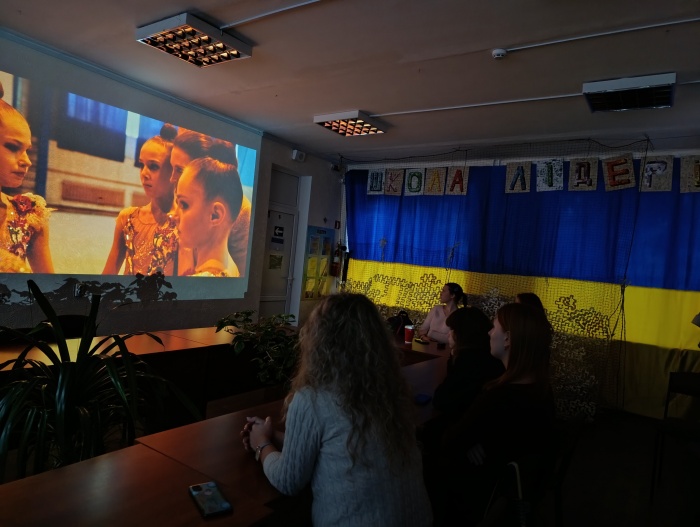
At the screening of Girl Away From Home in Chornomorsk.
“The Travelling Docudays UA is a fantastic project that shows how much we, the filmmakers and the audience, need each other, how important our contact is. You make it possible to hear the voices of people who are not broadcast by global media: after the screenings, many Ukrainians shared their thoughts and experiences with me. These were very powerful personal conversations that will stay with me for a long time,” says Daniel Stopa, director of Kiosk.
This yearʼs Travelling Fest turned out to be extremely eventful and colourful: in two months, our tireless regional coordinators managed to hold 594 film screenings with discussions, 16 press conferences and 103 human rights events in a combined format — seminars, trainings, lectures, “living libraries” with the participation of experts, civil society activists, human rights defenders, artists and scholars in 16 regions of Ukraine.
The festival was held live in 95 localities — in youth and cultural spaces, libraries, cinema clubs, schools and universities, and penitentiary institutions. This year's offline and online events of the Travelling Fest were attended by 70,165 viewers! 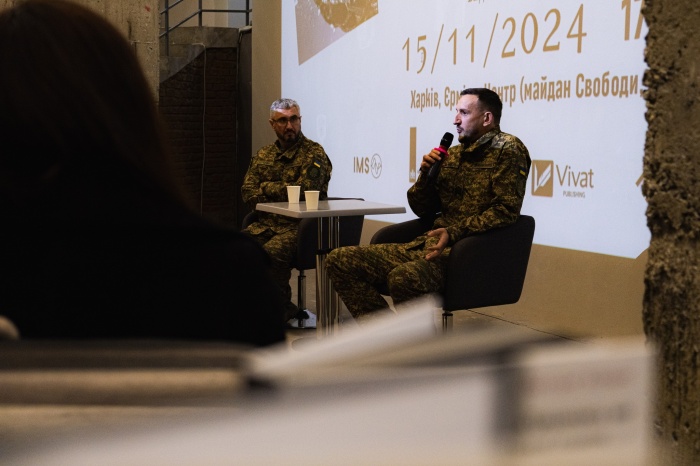
Screening and discussion of the film The Kyiv Files in Kharkiv with the participation of historians Volodymyr Birchak and Vakhtang Kipiani.
What is particularly heartbreaking and valuable is that despite the constant shelling and close proximity to the frontline, the regional coordinators managed to successfully organise Travelling Festʼs events in a number of frontline cities: Kharkiv, Kherson, Dnipro, Kryvyi Rih, Chornomorsk and Zaporizhzhia. The sound of the explosions makes talking about human rights especially meaningful.
Some of these cities have become a refuge for coordinators from Donetsk and Zaporizhzhia regions. Now they are making the residents of the communities where they had to move because of the war fall in love with the Travelling Docudays UA, and they are uniting their countrymen and women around them, wherever they are: in the same city, thousands of kilometres away, or under temporary occupation. For them, the festival is primarily about home.
“I want to leave people with something from their past life, something that was valuable to them,” says Olрa Leontieva, a regional coordinator from Melitopol. “I can't give them back their hometown, but I can give them a sense of belonging, a circle of people who understand, with whom they can share thoughts and emotions. What matters now is people and the connection between them. Travelling Fest preserves it and gives us all the strength to hold on.”
A common context unites entire regions. For example, Odesa and Dnipro regions, which hosted festivals from Berdiansk and Mariupol, organised a teleconference for the third time, which has become a good tradition: they watched the film Girl Away From Home about a young gymnast Nastia who was forced to leave for Germany at the beginning of the full-scale invasion. Afterwards, the audience had a heartwarming meeting with the film's co-author.
To ensure that everyone in Ukraine could join the festival, during the last week of November, we streamed all the films from the 21st Travelling Festʼs programme in the DOCUSPACE online cinema, and we also held screenings with closed captions and audio descriptions for people with hearing and visual impairments in Poltava, Kharkiv, Ivano-Frankivsk and Lviv. This created a space for important experiments: normative viewers were invited to close their ears or eyes and try for themselves what it is like to perceive a film only through the image or sound, and then discuss their experience and dive deeper into the issue of inclusion.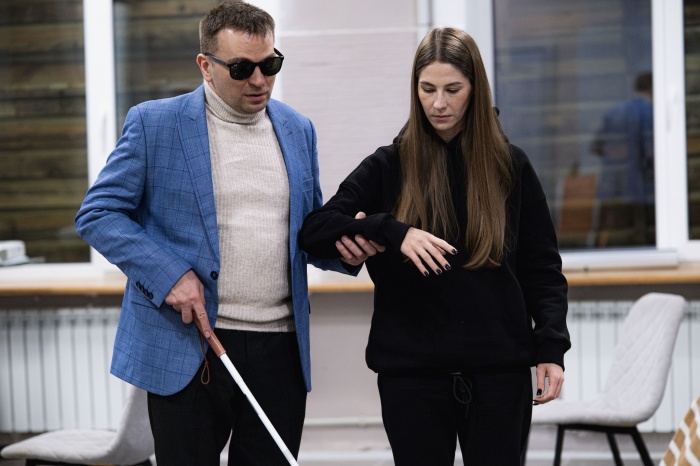
An event about barrier-free access with journalist Volodymyr Noskov in Kharkiv.
The Travelling Fest paid special attention to the topic of this yearʼs all-Ukrainian information campaign Sexual Abuse on the Internet: How to Protect Children, a joint initiative of the Docudays NGO and the Magnolia NGO. It was accompanied by the documentary Caught In the Net by Czech filmmakers Barbora Chalupová and Vít Klusák. It clearly shows what online communication platforms can become in the hands of some adults, and together with statistics, it destroys the idea that the problem is somewhere far away and “definitely does not affect our child.”
To draw the attention of parents and everyone who works with children, as well as to warn teenagers themselves, on 23 October, we screened the film and held an all-Ukrainian online discussion with leading Ukrainian experts in partnership with the human rights programme RIGHTS NOW!. We talked about how to recognise the signs of child sexual abuse on the Internet, who to turn to for help, who is responsible for combating these crimes, and how to protect children.
“When an adult, through the establishment of a trusting relationship, through manipulation, threats, blackmail, achieves certain goals that cause psychological or even physical harm to a child, it is abuse. Meanwhile, children may not be aware of what is happening to them at all,” said Maryana Hevko, a campaign expert and project manager at the DOCU/CLUB Network.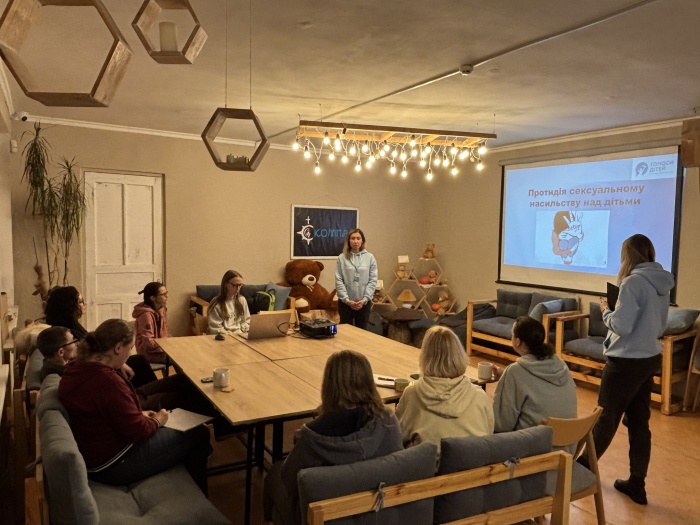
A meeting within the Travelling Docudays UA in Kryvyi Rih.
The screenings of the film Caught In the Net, workshops, lectures and discussions took place in most of the regions where the festival was held, and reached different audiences: from high school students to educators, lawyers and psychologists. These meetings were the first step towards breaking the taboo around the highly sensitive and stigmatised topic of child sexual abuse. Now the campaign will be picked up by the DOCU/CLUB film club network — the documentary has already been added to their collection.
It was the screening and professional discussion of this impressive film in Vinnytsia that ended the 21st Travelling Fest, which thus became unique and unforgettable in its own way.
We owe this first and foremost to Ukraineʼs defenders, as well as to everyone who believes in the mission of the Docudays NGO and walks with us side by side — donors, partners, the team, the indomitable regional coordinators, and the dedicated audience. We are proud that every year our community of like-minded people grows bigger and stronger.
We continue to create a society of free people and are already preparing for the next 22nd Docudays UA!
Photos were provided by the regional coordinators of the Travelling Docudays UA.
The 21st Travelling Docudays UA is supported by the Embassy of Sweden in Ukraine, the Embassy of the Kingdom of the Netherlands in Ukraine and International Media Support.
The opinions, conclusions or recommendations do not necessarily reflect the views of the governments or charitable organisations of these countries. The content of the publication is the sole responsibility of its authors.
“Docudays UA is a non-profit public organisation that implements cultural and educational projects at the intersection of cinema and human rights in Ukraine and abroad. These projects include: The Docudays UA International Human Rights Documentary Film Festival and the Travelling International Human Rights Documentary Film Festival, the Docudays UA DOCU/CLUB Human Rights Media Education Network of Film Clubs, the human rights programme RIGHTS NOW! the DOCUSPACE online cinema, the DOCU/PRO Ukrainian film industry development platform and the DOCU/CLASS documentary workshop, as well as the Docudays UA DOCU/SYNTHESIS interdisciplinary art programme and the Ukraine War Archive, launched in cooperation with the INFOSCOPE initiative.